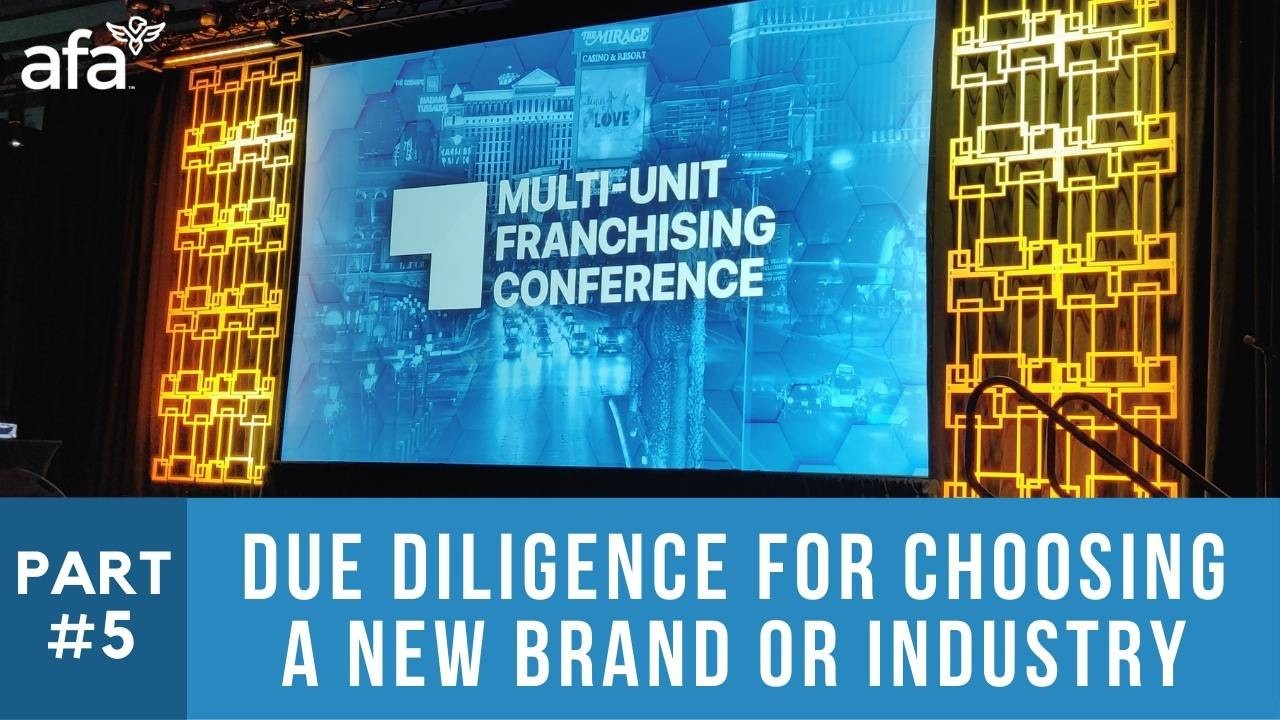10 Tips to Do Your Due Diligence When Choosing a New Franchise

(Part 5 of the 2022 Multi-Unit Franchising Conference)
As we continue the series on the Multi-Unit Franchising Conference, where I’ve been sharing all the experiences, panels, and keynote speaking that happened during this event, in this blog post I’m breaking down a session dedicated to the due diligence for choosing a new brand, segment or service system to expand your franchise portfolio.
There's a big umbrella called franchising, but under it, there are a lot of industries you can choose from. Foodservice is only 30% of what's possible. There’s another 70% of franchises in other industries. How can you select the ideal franchise for you?
During this panel, the participants shared best practices and tips on how to do that due diligence when you are in the last stages of choosing a new franchise brand, service, system, or segment.
The panelists were:
- Chris Klebba, MUMBO (Multi-Unit Multi-Brand franchisee) from Smoothie King, Buff City Soap, Altitude Trampoline Parks, and Planet Fitness.
- Donnell Thompson, an ex-NFL Colts football player and MUMBO from Checkers and Denny’s.
- Brad Kott, future multi-unit franchisee from HeyDey Skincare.
- Mike Lester, MUMBO from Walk-On's Sports Bistreaux and Crisp & Green.
If you are starting the process of searching for a new franchise investment, and even if you have already made a decision, use this information to analyze your selection and make sure the business is the best for your growing organization.
1. Look at the franchisee-franchisor relationship
Investigate if the franchisor is aligned with its franchisees and how is the communication across the brand.
The panelists concurred that when they planned the expansion of their businesses, they weren’t looking so much for a specific segment or industry. What they valued the most was the brand, the franchisor’s support, and the community they had created.
You can explore this by visiting the existing franchisees of the brand you are interested in to ask them questions. Your questionnaire should include questions like:
- What is the franchisor like?
- How accessible are the leaders or the executive team?
- What experience do they have? Are they the right leaders?
- What kind of relationship can you build with them?
- How much do franchisees know about what's happening in the brand?
- Are franchisees treated as partners or employees?
- How large is the franchisor's infrastructure? If it’s large, note that the payment comes from royalties.
You must also review the Franchise Disclosure Document (FDD) and any documentation you can find to discard any issues between the parts.
This is very insightful: regardless of the industry or segment, what is critical for the success of the brand and its units is the relationship between the franchisor and their franchisees.
If the franchisor is not readily willing to share information, consider this a red flag, warned Brad Kott. The brand you invest in has to be open and being able to have honest conversations with the leaders is a must.
This will help you if things go wrong because the franchisor, the leadership team, and your fellow franchisees can redirect you toward the right path.
2. Investigate what other franchisees are like
When you join a franchise system, not only are you under the franchisor's control and guidance, but you're entering a community of multiple franchisees with whom you want to be aligned and have similar values.
You have to remember that we are in business with people. They will become your family and you'll be spending many years with them. The better you are in alignment and agreement, the better your experience will be as a franchisee.
3. Favor what you enjoy doing
As part of the due diligence, be sure that whatever business you get into is something that you truly like doing. The brand has to be in alignment with your personal and business goals and also with your core values.
Donnell Thompson, for example, shared during the panel how he really liked the Checkers brand and how deeply knowing the brand gave him the power to be successful.
4. Evaluate the business model
Review the FDD, specifically item 19, which describes the average profit and loss statement.
Mike Lester advised to really take a careful look at those numbers. If you are not familiar enough with how the numbers work you should get yourself educated before you choose the brand. This will help you analyze the business the right way.
Review here what are the 3 most important numbers of your business.
5. Have a product that you can be proud of
If the product or service that the brand provides is something that you can be proud of, that is the right brand for you.
This is something critical for your future success because if you sell your offer with pride, your employees and your team will share the sentiment.
This will translate into them giving the proper service and products to your customers, who would then be proud of consuming your products or services.
6. Dig into the franchisor as an employer
Many online resources can tell you what the employees of a particular brand think of the business. Also, if there’s a high turnover and what score do these workers give to the franchise. This research will give you an insight as to what's happening inside the headquarters.
7. Consider how it fits your growth plans
If you are determined to be a multi-unit franchisee, you have to make sure the brand is aligned with the growth plan of your organization. That means that right off the bat you can negotiate and secure an area that would allow you to accomplish your expansion goals.
Doing so at the very beginning of the business relationship, the likelihood of you securing that growth will be higher.
Discover here the secret to becoming a successful multi-unit franchisee.
It's also a good idea to check out if the franchisor will share best practices in operations with you. For example, having meetings, regional conferences, or a national congress. Perhaps learning and development opportunities for their franchisees and their people. This will make a big difference in your growth opportunities.
8. Review if there’s area protection by unit
The area of protection by unit is an important consideration. Having a close district and being able to reserve it for when you can open more units will help you be more effective and more profitable.
Chris Klebba, for instance, shared how he’s not interested in having just a handful of units; when he looks for a new brand, he seeks to control large territories. That’s why he invests in new and emerging brands, rather than mature ones.
The conversation with the franchise owner from the very beginning has to be around how you'll be able to accomplish your business goals, what areas or markets you want to grow into, and if there’s a way to secure those areas.
This also makes financial sense: the more your units are spread, the less profitable you’ll be. That is just a multi-unit franchise principle.
On this matter, Brad Knott advised looking for a partner that is also opening units. If the franchisor is expanding, that'll give you the message that those units must be financially viable and successful.
9. Investigate how much the brand invests in innovation & tech
Make sure that your franchisor sees innovation as a true and intricate part of their business, and is not afraid to try emerging tech. Nowadays, if you're not high-tech and investing in improving the business constantly, you can be on the road to failure.
If the brand is not there yet but there’s a commitment from the leadership to explore the opportunities that technology brings to the business, that at least will give you the view that the future is going to be a positive one.
This vision has to go beyond technology. For example, if it’s food service, innovation may come in the menus; if it is retail, perhaps it'll be something around new SKUs that could be added; if it's a service brand, the option to expand their list of services.
10. Research the history of the brand
Around 20 years ago, a lot of the franchise brands were owned by the founder, their leaders were their relatives, and together, they grew it. Eventually, the second generation was the one running the business but as time went by, some of the successors started to sell.
As part of your research, investigate who owns the brand and who are they in debt with. Also, find out the following:
- Are they still family founder-owned? Or a private equity firm owns them?
- Who they were sold to?
- Who’s the leadership team?
- What other investments they have done?
- How was the performance of these investments after they took them over?
- What happened with the companies afterward?
Knowing this information will make a big difference in the current and future status of the brand, mentioned Brad Knott.
Aside from this checklist to do proper due diligence when choosing a new brand, segment, or system, these successful multi-unit franchisees shared operational tips and best practices.
If you want to dig into this information, subscribe to our YouTube channel to see the complete video series on the Multi-Unit Franchising Conference. Also, give us a thumbs up on Facebook, Instagram, and LinkedIn to get more valuable resources and information for your everyday business operations.
Reflections:
- How much time are you dedicating to the due diligence of choosing a new brand to invest in?
- Is the brand you are selecting in harmony with your personal and business goals?
- Will the brand support you even if things go wrong, having open communication and redirecting you on the right track?
- Is the business that you are getting into something that you truly enjoy doing and are proud of?
WATCH THIS VBLOG on YouTube HERE.



